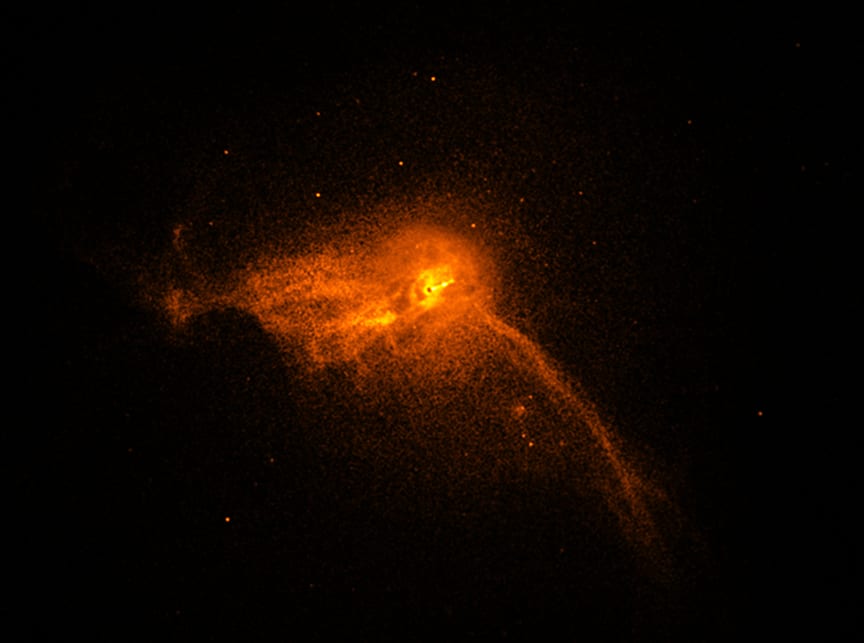The first image of a black hole taken by the Event Horizon Telescope on April 10, 2019. Credit: Event Horizon Telescope Collaboration
Astrophysics, Black Holes and the Universe: 10 Books to Improve Your Understanding of the Cosmos

The idea of black holes has captured our imagination for over two hundred years and on April 10, 2019 citizens of Earth got their very first look at a real black hole. Much of what we know of black holes comes from the fields of mathematics, gravitational physics, quantum mechanics and general relativity & quantum theories. Thanks to a network of radio telescopes, aptly called the Event Horizon Telescope (EHT), and a team of over 200 researchers across the globe we now have a picture of a black hole 55 million light years away in the Messier 87 (M87) galaxy. This image, that many think resembles a doughnut, will add greatly to our understanding of the universe.
For those of curious mind wanting to learn more about black holes, the UC Davis Library offers books that will help explain concepts in astrophysics and related fields. The books selected can be read by anyone – you do not need to know calculus and physics to understand the content – and by the time you finish one of these books you will have a deeper understanding about the mechanisms of the cosmos.
- The Ascent of Gravity: The Quest to Understand the Force that Explains Everything by Marcus Chown (London Weidenfeld & Nicolson, 2017). Call Number: PSE Library QC178 .C295 2017
Title summary: “Discusses the concept of gravity from its earliest recognition in 1666 to the discovery of gravitational waves in 2015, and explains why gravity holds the key to understanding the nature of time and the origin of the universe.”
- Black Hole: How an Idea Abandoned by Newtonians, Hated by Einstein, and Gambled on by Hawking Became Loved by Marcia Bartusiak (New Haven : Yale University Press, 2015). Available online via campus network or VPN
From the publisher’s website: “ This engrossing book tells the story of the fierce black hole debates and the contributions of Einstein and Hawking and other leading thinkers who completely altered our view of the universe.”
- Cosmic Catastrophes: Exploding Stars, Black Holes, and Mapping the Universe by J. Craig Wheeler (Cambridge ; New York : Cambridge University Press, 2007). Available online via campus network or Library VPN.
From the author’s website: “The story leads from the birth, evolution, and death of stars to the notion of complete collapse in a black hole, to worm-hole time machines, the possible birth of new universes, and the prospect of a conceptual revolution in our views of space and time in a ten-dimensional string theory.”
- Einstein’s Monsters: the Life and Times of Black Holes by Chris Impey (New York, NY : W.W. Norton & Company, Inc, 2019). Call number: Shields Library QB843.B55 I47 2019
From the publisher’s website: “In Einstein’s Monsters, distinguished astronomer Chris Impey takes readers on an exploration of these and other questions at the cutting edge of astrophysics, as well as the history of black holes’ role in theoretical physics—from confirming Einstein’s equations for general relativity to testing string theory.”
- Five Photons: Remarkable Journeys of Light Across Space and Time by James Geach (London : Reaktion Books, 2018). Call Number: Shields Library QB461 .G43 2018
From publisher’s website “Geach explains all through five tales of fascinating astrophysical processes that propel light across space and time. They are tales of quantum physics and general relativity, stars and black holes, dark matter and dark energy. Sweeping us away on electromagnetic waves, Five Photons is a journey of discovery toward a deeper, more enlightened understanding of this breathtaking universe.”
- Gravity! The Quest for Gravitational Waves by Pierre Binétruy (Oxford: Oxford University Press, 2018). Call Number: PSE Library QC178 .B56 2018
From the publisher’s website: “ This book uncovers gravity as a key to understanding these fascinating phenomena that have so captivated public interest in recent years. Readers will discover the latest findings on how this familiar force in our everyday lives powers the most colossal changes in the Universe.”
- A Journey into Gravity and Spacetime by John Archibald Wheeler (New York: Scientific American Library: Distributed by W.H. Freeman and Co, 1990). Call Number: PSE Library QB334 .W49 1990
Learn theoretical physics from the eminent John Archibald Wheeler who played a major role in our understanding of the universe and black holes. We can also thank Dr. Wheeler for giving us the concept of a ‘wormhole.’
- Quantum Fuzz: The Strange True Makeup of Everything Around Us by Michael S. Walker (Amherst, New York : Prometheus Books, 2017). Call number: PSE Library QC174.12 .W347 2017
From the publisher’s website: “Quantum physics has turned our commonsense notion of reality on its head. This accessible book describes in layperson’s terms the strange phenomena that exist at the quantum level–a world of tiny dimensions where nothing is absolutely predictable, where we rethink causality, and information seemingly travels faster than light.”
- Reality Is Not What it Seems: The Journey to Quantum Gravity by Carlo Rovelli, translators: Simon Carnell, and Erica Segre. Call Number: Shields Library QC178 .R69313 2017
From the book jacket “A closer look at the mind-bending nature of the universe. What are the elementary ingredients of the world? Do time and space exist? And what exactly is reality? Theoretical physicist Carlo Rovelli has spent his life exploring these questions. He tells us how our understanding of reality has changed over the centuries and how physicists think about the structure of the universe today. ”
- Seven Brief Lessons on Physics by Carolo Rovelli; translators Simon Carnell and Erica Segre (UK : Allen Lane, an imprint of Penguin Books, 2015). Call number: PSE Library QC24.5 C38 2015
From the publisher “These seven short lessons guide us, with simplicity and clarity, through the scientific revolution that shook physics in the twentieth century and still continues to shake us today…”